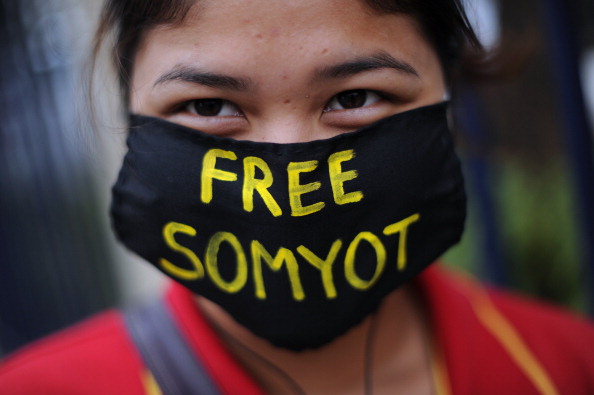
Imagine sitting down in a theater to watch the latest blockbuster, only to be asked to stand up before the film starts. So revered is the King in Thailand that movie-goers must stand while the royal anthem plays prior to every movie screening there, as a reel pays homage to the king.
Playing on this reverence to the king is the lèse majesté law,enacted in the country’s criminal code. Article 112 states that “whoever defames, insults or threatens the King, Queen, the Heir-apparent or the Regent, shall be punished (with) imprisonment of three to fifteen years.” The law is also used as a means to suppress freedom of speech in Thailand. Since the coup and military ouster of former Prime Minister Thaksin Shinawatra in 2006, authorities are using lèse majesté to prosecute an increasing number of anti-government activists.
On January 23rd, a court in Thailand sentenced journalist and human rights defender Somyot Prueksakasemsuk to ten years of prison for publishing two articles which allegedly insult the 85 year-old king. The prosecutors claimed that Somyot was the editor of Voice of Thaksin magazine when he published the two articles, which were written by someone else. The articles do not mention the king by name, but the court said the “writing conveyed connection to historical events.”
The extent of prosecutions under lèse majesté is frightful. In 2011, under the Computer-related Crimes Act and lèse majesté, a court sentenced 61 year-old Ampon Tangnoppakul to 20 years for allegedly sending text messages which insulted the royal family. He died a few months later in a prison hospital. In 2009, a judge ordered a closed trial in the prosecution of a Darunee Charnchoengsilpakul, a supporter of Prime Minister Thaksin, for a speech she made during a demonstration in 2008. Darunee filed a complaint that the closed trial violated her rights as guaranteed under the Constitution. Her complaint, however, was not sent on to the Constitutional Court and Darunee was sentenced to 18 years in prison for violating the laws of lèse majesté. During Darunee’s appeal, the appeal judge decided the complaint should have been sent on, and it was then sent to the Constitutional Court. The Constitutional Court wrote a comment in Darunee’s case, arguing that there is no conflict between a closed trial and the protection of rights and liberties. Finally, a new judgment in her case was issued and Darunee was sentenced to 15 years.
The king may be a respected figure in Thailand; however, the draconian prosecution of individuals under the lèse majesté law must stop. Somyot has already served twenty months in prison. His sentence violates the freedom of expression, guaranteed in the International Covenant on Civil and Political Rights. Having ratified the Covenant in 1996, Thailand needs to uphold its international obligation and ensure the immediate release of Somyot and all prisoners of conscience.
Claudia Vandermade, Amnesty International USA Southeast Asia Coordinator, contributed to this post.
